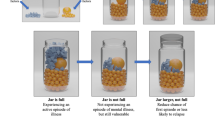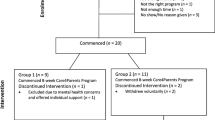Abstract
The presentation of 22q11.2 deletion syndrome (22q11DS) is symptomatically variable, presenting diagnostic challenges for paediatricians and anxious uncertainty in parents. The ‘lived’ experience of parenting a small child diagnosed with 22q11DS is unknown particularly how parents make sense, both positive and negative, of their role. A phenomenological study sought subjective interpretations from two fathers and four mothers of a young child (8–36 months) diagnosed with 22q11DS. Using interpretative phenomenological analysis, data were collected through semi-structured interviews and thematically analysed. Four themes embodied uncertainty and fear simultaneously experienced by these parents such as anticipatory traumatic distress, systemic stigma, confusion at professional smoke screens and ‘not knowing’. This cacophony of distressing emotions plagued their unanswered fear, guilt, loss and grief. In seeking hope, their parenting journey was able to be redefined as one of intrapersonal and interpersonal growth from the adversity of 22q11DS. This study provides a lens into the experiences of parents struggling to make sense of their journey with 22q11DS in the early parenting years. It highlights the complex distress of parenting a small child whose development is fraught with uncertainly and where stigma and suspicion are often experienced when seeking support from social and health systems. However, a metamorphosis of personal strengths also emerged facilitated by hope. Healthcare professionals can best assist through open discussion that acknowledges often limited knowledge, using the guidelines for management of 22q11DS in guiding parents.
Similar content being viewed by others
References
Bales, A. M., Zaleski, C. A., & McPherson, E. W. (2010). Newborn screening programs: should 22q11 deletion syndrome be added? Genetics in Medicine, 12(3). doi:10.1097/GIM.0b013e3181cdeb9a.
Bish, J. P., Ferrante, S. M., McDonald-McGinn, D., Zackai, E., & Simon, T. J. (2005). Maladaptive conflict monitoring as evidence for executive dysfunction in children with chromosome 22q11.2 deletion syndrome. Developmental Science, 8(1), 36–43. doi:10.1111/j.1467-7687.2005.00391.x.
Burr, W. R. (1973). Theory construction and the sociology of the family. New York: John Wiley & Sons.
Cheshire, A., Barlow, J., & Powell, L. (2010). Coping using positive reinterpretation in parents of children with cerebral palsy. Journal of Health Psychology, 15(6), 801–810. doi:10.1177/1359105310369993.
Figley, C. R. (Ed.). (1998). Burnout in families: the systemic costs of caring. Boca Raton, FL: CRC Press.
Fine, S. E., Weissman, A., Gerdes, M., Pinto-Martin, J., Zackai, E. H., & McDonald-McGinn, D. M. (2005). Autism spectrum disorders and symptoms in children with molecularly confirmed 22q11.2 deletion syndrome. Journal of Autism and Developmental Disorders, 35(4), 461–470. doi:10.1007/s10803-005-5036-9.
Folkman, S. (1997). Positive psychological states and coping with severe stress. Social Science and Medicine, 45(8), 1207–1221.
Fung, W. L. A., McEvilly, R., Fong, J., Silversides, C., Chow, E., & Bassett, A. (2010). Elevated prevalence of generalized anxiety disorder in adults with 22q11.2 deletion syndrome. The American Journal of Psychiatry, 167(8), 998. doi:10.1176/appi.ajp.2010.09101463.
Graungaard, A. H., Andersen, J. S., & Skov, L. (2011). When resources get sparse: a longitudinal, qualitative study of emotions, coping and resource-creation when parenting a young child with severe disabilities. Health, 15(2), 115–136. doi:10.1177/1363459309360794.
Green, T., Gothelf, D., Glaser, B., Debbane, M., Frisch, A., & Kotler, M. (2009). Psychiatric disorders and intellectual functioning throughout development in velocardiofacial (22q11.2 deletion syndrome). Journal of the American Academy of Child & Adolescent Psychiatry, 48(11), 1060–1068. doi:10.1097/CHI.0b013e3181b76683.
Hastings, R. P., & Taunt, H. M. (2002). Positive perceptions in families of children with developmental disabilities. American Journal on Mental Retardation, 107(2), 116–127.
Helgeson, V. S., Reynolds, K. A., & Tomich, P. L. (2006). A meta-analytic review of benefit finding and growth. Journal of Consulting and Clinical Psychology, 74(5), 797–816. doi:10.1037/0022-006X.74.5.797.
Kearney, P. M., & Griffin, T. (2001). Between joy and sorrow: being a parent of a child with developmental disability. Journal of Advanced Nursing, 34(5), 582–592. doi:10.1046/j.1365-2648.2001.01787.x.
Lenhard, W., Breitenbach, E., Ebert, H., Schindelhauer-Deutscher, H. J., & Henn, W. (2005). Psychological benefit of diagnostic certainty for mothers of children with disabilities: lessons from down syndrome. American Journal of Medical Genetics, 133A(2), 170–175. doi:10.1002/ajmg.a.30571.
Lindström, C., Åman, J., & Norberg, A. L. (2009). Increased prevalence of burnout symptoms in parents of chronically ill children. Acta Paediatricia, 99, 427–432. doi:10.1111/j.1651-2227.2009.01586.x.
Madeo, A. C., O’Brien, K. E., Bernhardt, B. A., & Biesecker, B. B. (2012). Factors associated with perceived uncertainty among parents of children with undiagnosed medical conditions. American Journal of Medical Genetics Part A, 158A(8), 1877–1884. doi:10.1002/ajmg.a.35425.
Maslach, C., & Jackson, S. E. (1982). Burnout in health professions: a social psychological analysis. In G. Sanders & J. Sulls (Eds.), Social psychology of health and illness. Hillsdale, NJ: Erlbaum.
McDonald-McGinn, D. M., Kirschner, R., Goldmuntz, E., Sullivan, K., Eicher, P., Gerdes, M., & Zackai, E. H. (1999). The Philadelphia story: the 22q11.2 deletion: report on 250 patients. Genetic Counseling (Geneva Switzerland), 10(1), 11–24.
Mishel, M. H. (1990). Reconceptualization of the uncertainty in illness theory. Journal of Nursing Scholarship, 22(4), 256–262. doi:10.1111/j.1547-5069.1990.tb00225.x.
Mishel, M. H., & Clayton, M. F. (2008). Theories of uncertainty in illness. In M. J. Smith & P. R. Liehr (Eds.), Middle range theory for nursing (pp. 55–84). New York, NY: Springer Publishing Company, LLC.
Murphy, K. C., Jones, L. A., & Owen, M. J. (1999). High rates of schizophrenia in adults with velo-cardio-facial syndrome. Archives of General Psychiatry, 56(10), 940–945.
Niklasson, L., Rasmussen, P., Oskarsdóttir, S., & Gillberg, C. (2005). Attention deficits in children with 22q11 deletion syndrome. Developmental Medicine and Child Neurology, 47, 803–807. doi:10.1017/S0012162205001702.
Oskarsdottir, S., Vujic, M., & Fasth, A. (2004). Incidence and prevalence of the 22q11 deletion syndrome: a population-based study in Western Sweden. Archives of Disease in Childhood, 89, 148–151. doi:10.1136/adc.2003.026880.
Papazoglou, K. (2012). Conceptualizing police complex spiral trauma and its applications in the police field. Traumatology, 19(3), 196–209.
Park, C. L., Cohen, L. H., & Murch, R. L. (1996). Assessment and prediction of stress-related growth. Journal of Personality, 64(1), 71–105.
Pozo, P., Sarriá, E., & Brioso, A. (2014). Family quality of life and psychological well-being in parents of children with autism spectrum disorders: a double ABCX model. Journal of Intellectual Disability Research, 58(5), 442–458. doi:10.1111/jir.12042.
Saloviita, T., Itälinna, M., & Leinonen, E. (2003). Explaining the parental stress of fathers and mothers caring for a child with intellectual disability: a double ABCX model. Journal of Intellectual Disability Research, 47(4–5), 300–312. doi:10.1046/j.1365-2788.2003.00492.x.
Shashi, V., Veerapandiyan, A., Schoch, K., Kwapil, T., Keshavan, M., Ip, E., & Hooper, S. (2012). Social skills and associated psychopathology in children with chromosome 22q11.2 deletion syndrome: implications for interventions. Journal of Intellectual Disability Research, 56(9), 865–878. doi:10.1111/j.1365-2788.2011.01477.x.
Shprintzen, R. J. (2008). Velo-cardio-facial syndrome: 30 years of study. Developmental Disabilities Research Reviews, 14, 3–10. doi:10.1002/ddrr.2.
Smith, J. A. (1996). Beyond the divide between cognition and discourse: using interpretative phenomenological analysis in health psychology. Psychology and Health, 11, 261–271. doi:10.1080/08870449608400256.
Smith, J. A., Flowers, P., & Larkin, M. (2009). Interpretative phenomeological analysis: theory, method and research. Los Angeles, California: SAGE Publications Inc..
Smith, J. A., Jarman, M., & Osborn, M. (1999). Doing interpretative phenomenological analysis. In M. Murray & K. Chamberlain (Eds.), Qualitative health psychology theories and methods. London: Sage Publications Ltd..
Stewart, J. L., & Mishel, M. H. (2000). Uncertainty in childhood illness: a synthesis of the parent and child literature. Scholarly Inquiry for Nursing Practice: An International Journal, 14(4), 299–319.
Stuart, M., & McGrew, J. H. (2009). Caregiver burden after receiving a diagnosis of an autism spectrum disorder. Research in Autism Spectrum Disorders, 3, 86–97. doi:10.1016/j.rasd.2008.04.006.
Acknowledgements
The authors would like to thank the participants for their generous contribution to this research project.
Author information
Authors and Affiliations
Corresponding author
Ethics declarations
No funding was required or given for this study.
Ethical Approval
All procedures performed in studies involving human participants were in accordance with the ethical standards of the institutional and/or national research committee and with the 1964 Helsinki Declaration and its later amendments or comparable ethical standards.
Informed Consent
Informed consent was obtained from all individual participants included in the study.
Rights and permissions
About this article
Cite this article
Goodwin, J., McCormack, L. & Campbell, L.E. Positive and Negative Experiences of Parenting a Pre-school Child with 22q11.2 Deletion Syndrome. Adv Neurodev Disord 1, 63–72 (2017). https://doi.org/10.1007/s41252-017-0010-z
Published:
Issue Date:
DOI: https://doi.org/10.1007/s41252-017-0010-z




